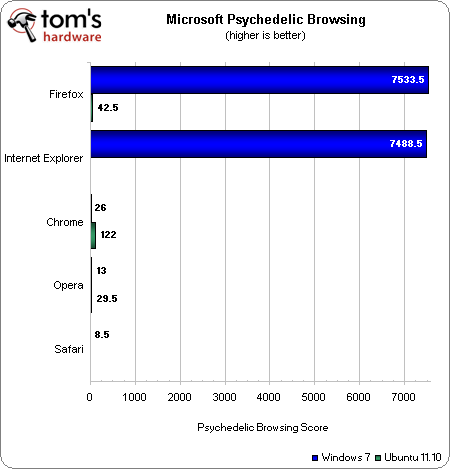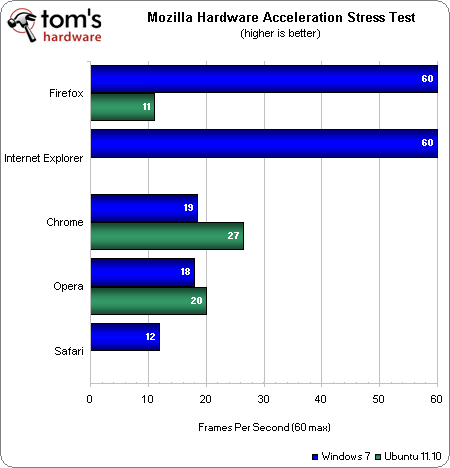Web Browser Grand Prix 9: Chrome 17, Firefox 10, And Ubuntu
Last month, we ran WBGP VIII on a MacBook Air, representing browser performance in a native Mac environment. Today we're returning to the PC. But the cross-platform comparison theme continues with a long-overdue rematch to WBGP 2: The Linux Circuit.
Hardware Acceleration Performance Benchmarks
Microsoft Psychedelic Browsing
Firefox makes a leap back to the top of Microsoft's Psychedelic Browsing benchmark, scoring over 7500 points. IE9 is right behind with a score just under 7500. Google Chrome finishes far behind, followed by Opera and Safari.
All of the Linux-based browsers do horribly in this test. Chrome, the only browser to achieve triple digits under Ubuntu, wins. Firefox takes second place and Opera falls to last place.
Mozilla Hardware Acceleration Stress Test
As usual, Firefox and IE9 tie for first place in Windows 7, both with scores of 60+ FPS. Second place is a close battle as well, with Chrome managing 19 FPS to Opera's 18. Apple Safari only manages to push 12 frames per second, earning a last-place finish.
Chrome takes the lead in Linux, followed by Opera. Firefox brings up the rear with a score of just 11 FPS.
Obviously, only Firefox and IE9 can be called Windows 7 winners. The rest of the Windows 7-based browsers and all of the Linux browsers show fairly poorly in HTML5 hardware acceleration.
Get Tom's Hardware's best news and in-depth reviews, straight to your inbox.
Current page: Hardware Acceleration Performance Benchmarks
Prev Page HTML5 Performance Benchmarks Next Page WebGL Performance Benchmarks-
mayankleoboy1 just wondering if use of a DX11 capable GPU will change scores in some HTML5 and other benchmarks as the browsers use DX11 assisted rendering.Reply
Also, AMD driver support in linux is poor compared to Nvidia.
For future Linux articles, can you use a Dx11 based Nvidia GPU? -
mayankleoboy1 IMO, Firefox is concentrating more on HTML5, ignoring CSS and JavaScript.Reply
It does well in HTML5 benches but 99% of the websites use primarily CSS and JS and HTML3, in which Firefox does poorly.
-
mayankleoboy1 Waiting for OPERA12. It keeps impressing me.Reply
Even without hardware acceleration, it keeps up with the competition,
When that beast launches, it will kill FF/IE and most probably chrome too. -
PreferLinux Who wants to guess that the poor Linux Flash and WebGL results were because Flash and WebGL don't use hardware acceleration with that graphics card and driver? I would be thinking so.Reply -
mitch074 Firefox performance took a dive starting with version 4, where all hardware acceleration was disabled: before then, in version 3.6, XRENDER was used when available (it was 4/5th as fast as IE9 on the same PC) while it is now really slow - it's all software.Reply
Moreover, the only driver enabled for hardware acceleration on Linux is the Nvidia driver: according to Mozilla (and verified by yours truly on AMD and Intel hardware), most display drivers in Linux suck when it comes to 2D rendering - ouch. Note that Mozilla and Google could add shims to circumvent those bugs, but they don't -not worth the effort, especially when driver makers could fix their bugs rather easily, leaving the browsers broken yet again. -
indian-art I use Chrome (19.0.1041.0 dev presently) the most on Linux (Ubuntu) and empirically I felt Chrome works very well. Now your tests confirm it.Reply
I find Opera 12 really nice too. It can run with Opera 11.61. Opera 12 has a silver icon & 11.61 has its classic red. I like Firefox & Epiphany too.
Its a shame Safari and IE are not truly cross-platform. -
mayankleoboy1 how many of those top 40 sites use HTML5?Reply
i think that the HTML5 scores should be weighed by a factor of the percent of top40 sites that use HTML5.
This way actual importance of HTML5 can be judged in real world. -
nd22 It's a shame Apple does not pay enough attention to the Windows market and optimize their browser! On Mac Safari is king of the hill - personal opinion of course!Reply
On Windows I feel that IE9 works really well for me, although Chrome is the speed demon! FF 4+ lost their appeal for me. -
forestie The OSes that are used are 64 bits but the browsers are mostly (all?) 32bits on Windows, and probably 64bits on Linux.Reply
Internet Explorer has 64bits builds on Win7, and Firefox has "almost" a 64bits browser on Windows too: Waterfox, which is a semi-official Firefox for 64bits Windows. Waterfox in particular claims huge improvements over base 32bits install, I would like to see how that translates into real-world.
Not sure about availability of 64bits editions of other browsers on Windows.
Here are my wishes:
-clearly mention if the 32bits or 64bits version of the browser is used
-where applicable and relevant, test with both 32bits and 64bits variants. I would like to see IE and FF split into 32 and 64 variants on Win for example.
I personally migrated from FF to WF on my machines 3 weeks ago and find it noticeably faster in everyday use. WF is now my main browser. -
doive1231 As long as phones keep using Android, Chrome will be the most popular browser for a long while. Google have got it all sorted.Reply

